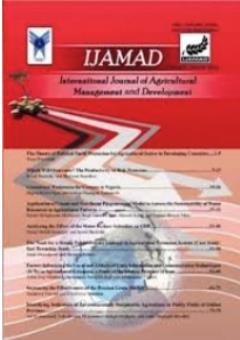Analysis of Knowledge Management Network in the New Agricultural Extension System in Iran
Subject Areas : Environmental policy and management
Keywords: Information and communication technology, Knowledge network, agricultural extension system, Organizational culture, Organizational structure.,
Abstract :
Knowledge management in the agriculture sector in order to access farmers to technical knowledge and research findings is one of the goals of the agricultural extension system. This research aimed to analyze knowledge management network in the new agricultural extension system in Iran. In this study, the interaction of three contextual (organizational structure, organizational culture and information and communication technology), process (production, storage, organization and distribution of knowledge) and performance (stakeholders’ access to technical knowledge and research findings) variables on each other has been studied. This study is quantitative in terms of nature of the data, in terms of the amount of control variables is non-experimental, in terms of research method is descriptive-correlational, which was done through a survey technique. The sample of the study included all agricultural extension specialists of Zanjan province and the assistant researchers in the research centers which were 143, and 28 people, respectively. Questionnaire was the main instrument for data collection. Validity of the questionnaire was verified using average variance extracted. Composite reliability coefficients and Cronbach’s alpha were calculated for determining the reliability of the questionnaire. Data were analyzed by structural equation modeling technique using Smart PLS software. Results showed that among the contextual factors, only the relationship between information and communication technology and process variables has become significant. Contextual factors explained 28.9% of the variance of the process variable. There was a positive and significant relationship between knowledge management and performance variable. Knowledge management could explain 53% of the variance of the performance variable.

